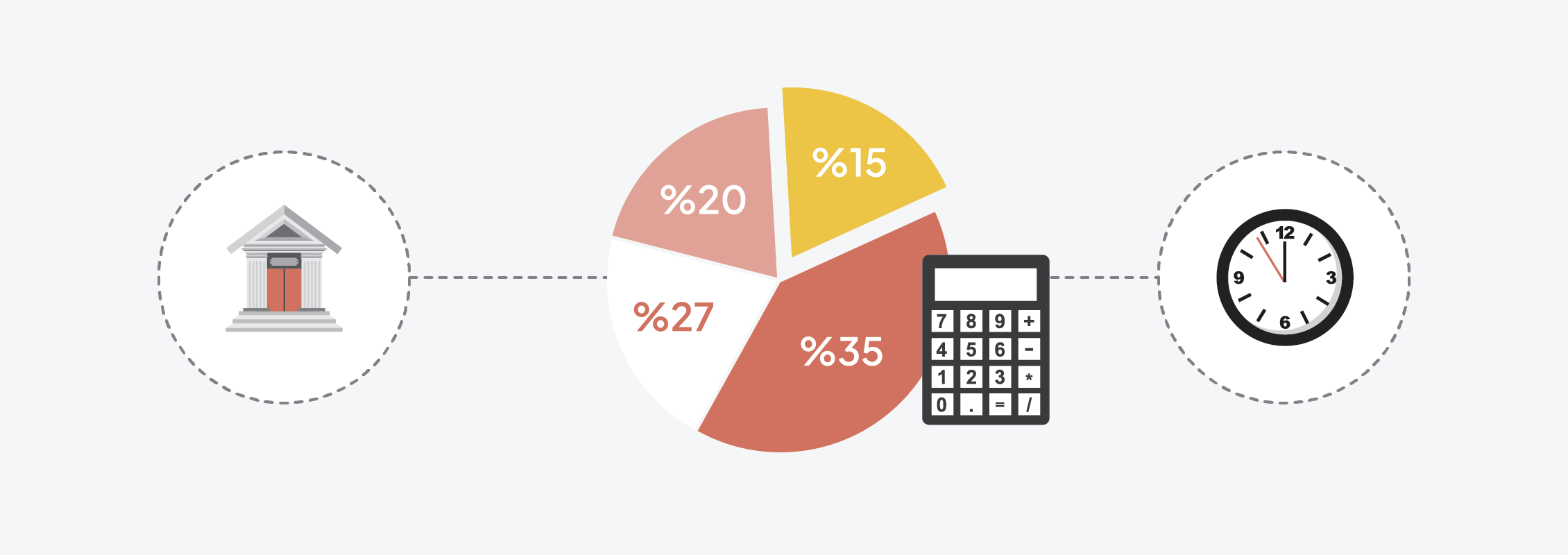13 Kasım 2024
What is an E-Declaration? How to Prepare an E-Declaration?

What is an E-Declaration?
The E-Declaration is a system provided by the Revenue Administration (GİB) that allows taxpayers to submit their tax declarations electronically. Developed to reduce congestion at tax offices and expedite processes, the e-declaration system was regulated with Communiqué No. 340 of the Tax Procedure Law (VUK), after amending Article 257 of Law No. 213. This system, which provides significant convenience for taxpayers, ensures the effective management of declaration processes in compliance with legal regulations.
How to Apply for an E-Declaration?
The application for an e-declaration can be made in two ways through forms in the “Internet Tax Office” section on the Revenue Administration's website.
- For Taxpayers Seeking Permission to Submit E-Declarations: Taxpayers who are not required to have their declarations signed by a professional based on their total assets or net sales revenue, as per Communiqués issued under Law No. 3568 (Certified Public Accountancy and Sworn-in Certified Public Accountancy Law), must fill out the "Electronic Declaration Submission Request Form" (In Turkish) and submit it to their local tax office to utilize the application.
- Taxpayers Seeking Authorization to Act as an Intermediary for E-Declaration Submission: Professionals seeking authorization to act as an intermediary for electronic declaration submission must complete the “Request Form for Authorization to Act as an Intermediary for Electronic Declaration Submission” (In Turkish) and apply in person at their local tax office. In cases where operations are conducted as a legal entity, the legal representatives are required to apply.
Is the E-Declaration Mandatory?
Under the Tax Procedure Law, the E-Declaration is mandatory for various tax types. Particularly with the regulations introduced in 2008, the following tax declarations are required to be submitted electronically:
- Annual Income Tax Declarations
- Corporate Tax Declarations
- VAT Declarations
- Quarterly VAT Declarations
- Banking and Insurance Transactions Tax Declarations
- Temporary Tax Declarations
- Withholding Tax Declarations
- Special Consumption Tax (ÖTV) Declarations
- Gaming Tax Declarations
- Special Communication Tax Declarations
- Amended Declarations
What Programs are Required for the E-Declaration?
To use the e-declaration system, the following programs need to be installed:
- Declaration Preparation Program (BDP): The main software for preparing and managing declarations.
- Java Runtime Environment (JRE): Necessary for the BDP software to function.
- Adobe Acrobat Reader: Used for viewing declarations in PDF format.
These programs can be downloaded from the Revenue Administration’s website and should be regularly updated.
How to Prepare an E-Declaration?
The Declaration Preparation Program (BDP) provided by the Revenue Administration is used to prepare an e-declaration. This software ensures that declarations are prepared completely and accurately.
Steps to Prepare an E-Declaration:
- Download the Software from the GİB Official Website: Download the Declaration Preparation Program (BDP) and JRE from the GİB website.
- Install the Program and Enter Declaration Information: Fill in the taxpayer information, tax amounts, and other necessary details in the software.
- Log in to the E-Declaration System Using the Code and Password Provided by the Tax Office: Check all information before approving the declaration.
- Submit the Declaration: Once the declaration is uploaded to the system without any error messages, proceed with the approval process.
How to Submit an E-Declaration?
After preparing the e-declaration according to the above steps and completing the packaging process, log in to the e-declaration section on the GİB website with your user code and password. After logging in, select the package submission button to upload the packaged declaration to the system.
How to Update an E-Declaration?
If an error or omission is detected in the submitted declaration, an amended declaration must be submitted to correct it. First, the amended declaration form on the GİB website should be completed. The amended declaration is prepared in addition to the initial declaration to ensure that inaccurate or missing information is correctly stated.
How to Submit an Amended Declaration?
- Use of the Declaration Preparation Program (BDP): The amended declaration is prepared using the BDP downloaded from the GİB's official website. Select the relevant declaration type and indicate the period to be corrected in the program.
- Mark the Correction Option: After selecting the declaration type in BDP, mark the "Amended Declaration" option to signal the system that the declaration is for correction purposes.
- Correct the Inaccurate Information: Enter the correct data to replace any inaccurate or missing information from the initial declaration. For example, if there is an adjustment increasing or decreasing the base amount, update the relevant fields accordingly.
- Approval and Submission: The amended declaration is approved and submitted electronically to GİB using the code and password obtained from the tax office.
Who Can Submit an E-Declaration?
The E-Declaration is a system that allows taxpayers to prepare and submit their declarations electronically to the Revenue Administration (GİB). It is mandatory for certain taxpayer groups. The following taxpayers are required to submit e-declarations:
- Corporate Taxpayers: Legal entities must submit their corporate tax declarations electronically for their income.
- Income Taxpayers: Taxpayers taxed on real income from commercial, agricultural, or professional activities must submit their declarations via the e-declaration system.
- VAT Taxpayers: VAT declarations are among those required to be submitted electronically.
- Withholding Declaration Submitters: Employers and those responsible for withholding tax must submit their withholding declarations via the e-declaration system.
- Special Consumption Tax (ÖTV) Taxpayers: Taxpayers involved in transactions subject to ÖTV must submit their declarations electronically.
- Banking and Insurance Transactions Tax (BSMV) Taxpayers: Taxpayers subject to this tax must also submit their declarations electronically.
- Special Communication Taxpayers: Telecommunications companies must submit declarations related to this tax electronically.
- Games of Chance Taxpayers: Companies organizing games of chance must submit the relevant declarations via the e-declaration system.
- Real Estate Revenue Taxpayers: Taxpayers who earn rental income and are required to declare it must submit their declarations electronically.
- Freelancers: Professionals such as lawyers, doctors, and engineers must submit their income tax declarations via the e-declaration system.
- Notaries and Public Institutions: Notaries and certain public institutions are required to submit their declarations electronically.
- Cooperatives and Unions: Organizations like agricultural credit cooperatives and unions must submit their declarations via the e-declaration system.
- Taxpayers Who Have Signed Full Certification Agreements with Sworn-in Certified Public Accountants: These taxpayers must also submit their declarations electronically.
What are the Advantages of the E-Declaration?
The primary advantages of the e-declaration system are as follows:
- Quick and Secure Transactions: Declarations are prepared and submitted swiftly in a digital environment.
- Digital Archiving: Declarations are archived digitally, allowing easy access to past information.
- Reduced Error Rate: Electronic declaration minimizes errors compared to manual processes.
- Reduced Paper Consumption: The e-declaration system minimizes paper usage by allowing declarations to be prepared and submitted electronically, thus contributing to environmental sustainability and reducing costs.
It enables taxpayers to prepare and submit their tax declarations electronically to the Revenue Administration (GİB). Mandated by Law No. 213 (Tax Procedure Law - VUK), declarations are prepared and approved using programs like the Declaration Preparation Program (BDP) and Java Runtime Environment (JRE). This legally structured system saves time for taxpayers and enables them to present their tax declarations accurately.
Should you have any queries or need further details, please contact us.
Notification!






